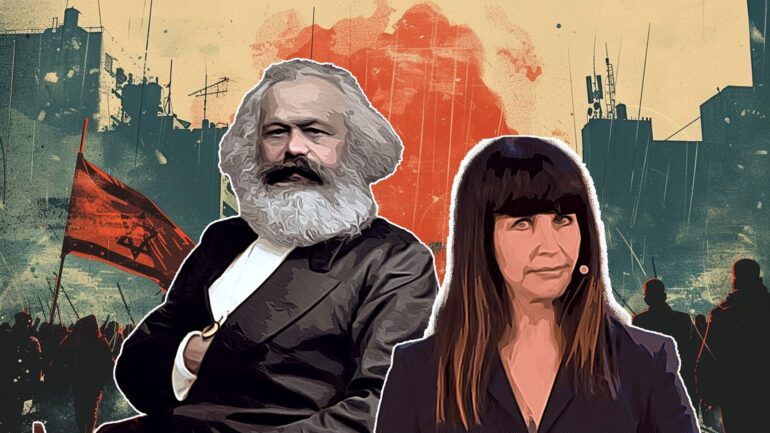“The judicial reform was really a proxy issue for who gets to govern Israel, and that those who were in the streets calling for – you know – democracy and defending the Israeli Supreme Court were actually there for a far deeper reason, which I do think bourne itself out, that an extreme right-wing government just cannot govern the State of Israel, period. And that those are people who are not legit – I mean they may have official democratic legitimacy, they may have the numbers, they might have won the elections, but they don’t have deep legitimacy.”
These were the words of former Labor party lawmaker and author Einat Wilf on a recent episode of the Call Me Back podcast.
Wilf is perhaps the most prominent representative of Liberal Zionism in the English language, and while her castigations of Israel’s political leadership may seem vague or petty, it is necessary that they be understood.
For starters, when she refers to the current coalition as an “extreme right-wing” government, what does she actually mean? Once we understand this, we can try to identify this “deep legitimacy” they continue to lack.
The rise of liberal, representative democracy comes through European society’s transition from feudalism to capitalism. This transition caused a shift of wealth from the benefactors of noble privilege to those with access to the means of production.
Those who were in favor of social change during this transition were termed “left-wing” while those resistant to social change were termed “right-wing.” Within the paradigm of the liberal ideology that acts to present capitalism as a moral and just system, affinity towards tradition and particularism is often regarded as right-wing – even when deployed in opposition to cultural imperialism.
By “extreme right-wing,” Wilf refers to Israeli political figures who are deeply connected to a particularist Jewish story and either overtly reject or simply function outside the ideological paradigm of Western liberalism. These figures are not necessarily more hostile to Palestinians than Wilf or her fellow travelers but, due to their provinciality and lack of Western social pretenses, they express themselves in ways that sound too much like our neighbors and irk those – like Wilf – who envision Israel as an outpost of Western civilization in an otherwise “savage” region.
From Wilf’s perspective, liberal ideology reflects the peak of human progress. For Israel to be a successful state, it must function as a liberal Western state. Therefore, non-liberal socio-political forces within Israel cannot be considered “legitimate” leaders, even when brought to power by the democratic expression of the Israeli masses.
As part of the transition from feudalism to capitalism, the new capitalist class created a system of government where the barrier to power was no longer noble privilege but rather access to capital; representative democracy. Just as feudal aristocracy was designed to enshrine and protect the power of the landed noble elite, representative democracy was designed to enshrine and protect the power of the capitalist class.
Just as the feudal political system maintained power for the noble elite, by changing the lone barrier to power to access to capital, necessary to fund a successful campaign for representative office, representative democracy would guarantee power would remain among the capitalist class or at least those beholden to them.
This movement was wrapped in the ideological banner of liberalism just as feudal aristocracy had been disguised through Christianity, an ideology deputized to justify the dominance of a material elite. Karl Marx dissents this phenomenon – an ideological superstructure – in The German Ideology:
“The ideas of the ruling class are in every epoch the ruling ideas: i. e., the class which is the ruling material force of society is at the same time its ruling intellectual force. The class which has the means of material production at its disposal, consequently also controls the means of mental production, so that the ideas of those who lack the means of mental production are on the whole subject to it. The ruling ideas are nothing more than the ideal expression of the dominant material relations, the dominant material relations grasped as ideas; hence of the relations which make the one class the ruling one, therefore, the ideas of its dominance. The individuals composing the ruling class possess among other things consciousness, and therefore think. Insofar, therefore, as they rule as a class and determine the extent and compass of an historical epoch, it is self-evident that they do this in its whole range, hence among other things rule also as thinkers, as producers of ideas, and regulate the production and distribution of the ideas of their age: thus their ideas are the ruling ideas of the epoch. For instance, in an age and in a country where royal power, aristocracy and bourgeoisie are contending for domination and where, therefore, domination is shared, the doctrine of the separation of powers proves to be the dominant idea and is expressed as an ‘eternal law’.” (Marx, 67)
Marx argues that in any given historical epoch, the ideas of the ruling class are the dominant or prevailing ideas in society. The ruling class is the one with control over the material (economic) forces of society. In other words, those who own and control the means of production also control the means of mental production (the production of ideas). The ruling class, due to its control over the economic system, also controls the production and dissemination of ideas. This means that the ideas circulating in society are influenced and shaped by the interests and perspectives of the ruling class. The ruling ideas are seen as the ideal expression of the dominant material relations.
In simpler terms, the prevailing ideas in society reflect and serve the interests of the class in control of the economy. The ruling ideas are not independent of the material conditions; rather, they express and justify the relations that keep one class in power. The individuals within the ruling class not only have economic power but also possess consciousness and the ability to think. As a ruling class, they use their intellectual capacities to shape and control the prevailing ideas of their time. In doing so, they influence the entire range of societal thought, acting as both rulers and thinkers.
Marx provides an example to illustrate his point. In a society where different classes, such as royal power, aristocracy, and the bourgeoisie (capitalist class), are vying for dominance, the idea of the separation of powers (a concept often associated with the balance of power among different branches of government) becomes dominant.
This idea serves the interests of a society characterized by power struggles among these classes. More pertinent to our specific discussion on “deep legitimacy” in liberal democracy, the idea of representative democracy, where the sole barrier to entry is the capital necessary to run a successful political campaign, becomes dominant.
The previous election in Israel, however, saw a government of six parties, all of whose voter bases earn under the average Israeli income. All of the parties whose voter bases earn above the average Israeli income were left in the opposition.
Keep in mind that in Israel there is an incredibly intersectional relationship between issues of class, proximity to tradition, and edot (defined by the regions Jews resided for the duration of our long exile).
All of the factions comprising the current government hold voter bases of majority masorti, dati, or Ḥaredi Jews while all of the Jewish parties in the opposition have voter bases with at least a plurality defining themselves as secular (which essentially amounts to adopting the liberal ideological paradigm of the capitalist West).
All of the government parties (UTJ aside) were voted in by at least pluralities of Mizraḥi Jews in their voter base while all of the Jewish parties in the opposition had voter bases of majority Ashkenazim.
For Wilf and the Israeli bourgeoisie, any victory for the class that supports the parties in the current coalition is either a fluke or an injustice. Liberal democracy was designed to enshrine the power of the capitalist class, not the masses, no matter how large or organized.
In a sense, Wilf is right. A victory for the socio-economic underclass in a liberal, representative democracy is illegitimate. It is an undercutting of the system and those it is meant to protect. And because Wilf is to a degree correct, we would be wise to seriously consider upgrading our political system with alternatives more equitable to all people in this land – alternatives not only more truly democratic in practice, but also more deeply rooted in the history and values of the Jewish people.





